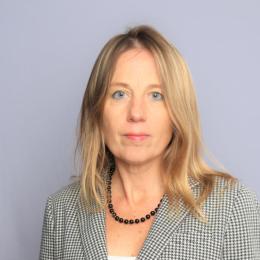Banner artwork by ProStockStudio / Shutterstock.com
Veronica Pastor: Ivana, you have been the 2022-2023 chair of the HNBA corporate counsel division. In your day job, you are Verizon’s head of public policy for Canada, Latin America, and emerging markets, and regulatory counsel. You are also a longstanding member of ACC. When I attend meetings of the HNBA corporate counsel division, I can’t help noticing that a very large number of members of the division are also members of ACC. It seems to me that although there is some overlap, a lot of us see membership in both organizations as providing complementary benefits. What do you see as those benefits and how can we encourage our members to leverage both?
Ivana Kriznic: HNBA was founded in 1972, so it is a little bit older than ACC. Its stated mission was and is to be the national voice of the now more than 78,000 Hispanic legal professionals and students in the United States. In addition, the HNBA advocates on issues of importance to the more than 62 million people of Hispanic heritage living in the United States. So, HNBA is not just about the interests of the legal profession; it encompasses other advocacy priorities relevant to the broader Hispanic community.

The most successful in-house counsel leverage the resources that each organization provides and contribute to both associations through submissions of legal article and participations in CLEs, conferences, and regional and national events.
The HNBA also includes the Vision in Action 501(c)(3) foundation, known as VIA. It is similar to the ACC Foundation. Its mission is to empower the Hispanic community through education, by creating and supporting initiatives that increase access to educational opportunities, career advancement, and leadership positions.
As chair of the HNBA Corporate Counsel Division, I notice that the most successful in-house counsel leverage the resources that each organization provides and contribute to both associations through submissions of legal articles and participation in CLEs, conferences, and regional and national events. The HNBA and the ACC offer opportunities for leadership in divisions, sections, and chapters that can be complementary. I encourage in-house attorneys in the HNBA to get to know more about ACC, and likewise, ACC members can look for opportunities to engage with other legal affinity groups.

The HNBA and the ACC offer opportunities for leadership in divisions, sections, and chapters that can be complementary.
Pastor: HNBA membership has traditionally been focused on homegrown US lawyers who consider themselves members of the Hispanic community. Generally, that meant people who grew up in this country, obtained a JD from a US law school, and then practiced law in the many avenues available to lawyers in the United States.
As a law student, I benefitted greatly from the HNBA’s mentor program, and I can say that their encouragement helped launch my legal career. HNBA’s representation of the US Hispanic community has always been inclusive. The organization derives its richness from being able to assemble under the same banner the many sub-groups of which the Hispanic community is composed — Chicanos, Puerto Ricans, and Cubans to name but a few, into La Familia (the family).
Now we have exciting news: La Familia is expanding! Can you talk about how HNBA is reaching out outside its traditional constituency and the benefits this is bringing for all involved?
As a law student, I benefitted greatly from the HNBA's mentor program, and I can say that their encouragement helped launch my legal career.
Kriznic: The integration of foreign-trained attorneys from Mexico, Brazil, Spain, and other countries into the US legal profession is very dear to my heart, as I am one of them. I have a law degree from the Universidad de Buenos Aires in Argentina and a subsequent Master of Laws (LLM) from Columbia Law School.
After passing the New York State Bar Exam, I have practiced law in different roles for over 20 years. Foreign-trained attorneys bring valuable skills like cultural competence and sensitivity that are critical in international compliance, complex negotiations, and cross-border disputes. Also, in my view, they have double the knowledge, they get foreign legal systems, usually civil law systems and the US legal system, and can “translate” concepts.
I am so grateful for the incredible professional opportunities I have had in this country. It is time for me to pay it forward. A few months ago, the HNBA under the leadership of President Mariana Bravo created a Foreign Trained Attorney Section to provide a space for foreign-trained LLMs and others to share experiences and career advancement strategies. I have the privilege of being the first co-chair of this section. Together with my co-chair, international litigation, and arbitration expert Michael Fernandez, we plan to liaise and collaborate with US law schools and foreign bar associations to help educate and prepare foreign-trained attorneys regarding US legal careers.
Pastor: The legal Familia is changing to reflect what is going on around it. Hispanics make up about 18.5 percent of the US population, but only about five percent of the 1.3 million lawyers in the United States today. Only two percent of those 1.3 million lawyers are Hispanic women — the lowest representation of any ethnic group. There may be cultural reasons for this, and the HNBA has a standing Latina Commission to study and remedy barriers to entry and advancement of Latina lawyers.
Hispanics make up about 18.5 percent of the US population, but only about five percent of the 1.3 million lawyers in the United States today.
At the same time, there has been an influx of foreign-trained lawyers from Latin America who are facing their own barriers to entry. In order to practice in the United States, they generally have to undertake a costly LLM and pass a state bar. And then they have to translate their education and experience into something of use to a potential employer — sometimes by taking a bottom-up approach and starting at a lower level than their education and experience would otherwise warrant.
So, I think there is a commonality of experience that cuts across many levels, but there is also a will on both sides to open the tent to include both US-born and foreign-trained lawyers.

Kriznic: Absolutely, we recognize and celebrate diversity within the Hispanic community in a range of dimensions, and that diversity is represented in the different sessions and commissions of the HNBA. For instance, sexual orientation, religion, different abilities like neurodiversity, race (Afro-Latinos, mixed-race), fluency in Spanish and English, country or region of origin, immigrants, first generations.
But there is also a powerful thread of Familia, as you pointed out, built on the foundation of a common language, culture, and values. I am not sure how to explain it, but something magical is happening at HNBA events. I have heard other HNBA members tell similar stories.
I vividly remember the first time I went to the Annual Convention. It was in 2019 in New York City. I did not know a single person. It was intimidating. I imagine an imposing conference room with hundreds of attorneys. Everyone was genuinely welcoming. I found I was able to connect in a very authentic way because of the language and the life experiences we shared growing up in the Hispanic culture, from Barcelona to Tierra del Fuego. This is the attitude of the HNBA and its leaders: “If you are new to our Familia, we welcome you!” This is also the spirit of inclusion that ACC fosters through its many programs and activities as well as the work of the ACC Foundation.
We recognize and celebrate diversity within the Hispanic community in a range of dimensions, and that diversity is represented in the different sessions and commissions of the HNBA.
Pastor: One of the issues that ACC and HNBA emphasize is that the legal profession is increasingly a revolving door. And as members of organizations that are committed to diversity and inclusion, we must do our part to help each other succeed, whether as in-house counsel or private practice lawyers.
In 2020, the ACC Foundation and HNBA held a joint panel on this topic, and the HNBA Corporate Counsel Division chair at the time Conchita Valenzuela and I co-authored a piece in the ACC Docket emphasizing the importance of origination credit and how both in-house and law firm lawyers can use their position to ensure their non-traditional colleagues get the visibility they deserve. You and I are prime examples of how that cross-pollination works! When we met, I was a young lawyer in private practice, and you were my client — remember that story? How did we get to today?
Kriznic: We go way back, Veronica. I was working in the legal department of the telephone company in Argentina. You were with a large American law firm. You came to Buenos Aires for a conference, and I remember you had such an impressive command of international matters but most importantly you spoke the language and knew the culture. That is how you sealed the deal and became outside counsel for the telephone company.
Our story is the perfect example of how professional relationships develop and intersect multiple times.
I don’t think I have ever told you that you were the first American attorney I met in person and inspired me to come to study in the United States. A few years later, when I finished my LLM a letter of recommendation from you helped me land my first job with a big law firm in Washington, DC. At that point, you were in-house counsel with a large telecommunications company. Our story is the perfect example of how professional relationships develop and intersect multiple times.

Pastor: We kept in contact over the years, and here we are again! I think it is fair to say you have had an amazing professional trajectory, and that your career has taken you in directions you never thought it would. So, on a personal level, what motivated you to become a lawyer? How did you end up choosing telecommunications law? Why did you decide to move to Washington DC? And what do you find most exciting about your current practice?
Kriznic: Thank you for your kind words. Problem-solving and achieving tangible results are the aspects of the legal profession that I enjoy the most. On the other hand, I am fascinated by “new” ideas and technologies and because I am a very optimistic person my mind is more in the future than in the present. Telecommunications law plays to my strengths, it is a continuously evolving field and there is no shortage of complex challenges to tackle.
What I love about my current work in the international public policy field is the opportunity to engage with people from different countries and cultures. Washington, DC is such a vibrant international city; I feel at home here. On a personal note, I am brimming with pride because my son wants to become a lawyer. I still have to persuade my daughter to follow suit.





